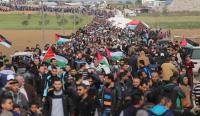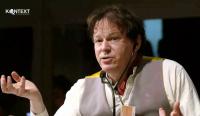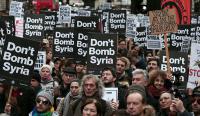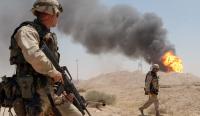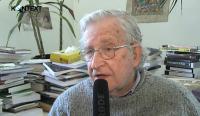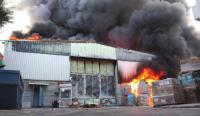The situation in Gaza and the Westbank has been worsened in the last twenty years. The suppression of Palestinians by the occupying force Israel has become harsher and more violent, says Sara Roy, senior scholar at the Center for Middle Eastern Studies at Harvard University. The Israeli authorities have done a lot of damage as Palestinians are denied a dignified life resulting from the theft of land and water, the destruction of homes and economic blockades. The Gaza strip continues to be occupied, an isolated prison, disconnected to the Westbank. This separation policy destroys not only the economy but also “any sense of a national collective, or political collective”. It is the outcome of the Peace Process. “Oslo, from the beginning was a very damaging process.”, says Roy.
Sara Roy, Senior Research Scholar at the Center for Middle Eastern Studies, Harvard University
David Goeßmann: Welcome to Kontext TV. Today we’re at Harvard University in Cambridge, Massachusetts. Our guest today is Sara Roy. Sara Roy is a senior research scholar at the Center for Middle Eastern Studies. She is one of the leading researchers on the Gaza strip, Palestinian politics in the occupied territories and on the Israeli-Palestinian conflict. Her family was murdered in the holocaust. Only her parents survived the Nazi extermination camps in Auschwitz and Chelmno, also known as Kulmhof, in Poland. Welcome to context TV, Sarah Roy, it's a great pleasure to have you. What is the situation like for Palestinians living in Gaza and the West Bank? You have traveled to Gaza and the West Bank several times and have done a lot of fieldwork over there? What have you learned?
Sara Roy: From the time that I began my research in 1985 through to today, I can tell you unequivocally, that the situation for Palestinians living there and in the West Bank as well is extremely adverse. It has deteriorated dramatically over time. The occupation, Israeli occupation, has become much more repressive, much more violent in that sense of one defines violence, not only as guns and attacks, but also defined as the denial of rights, denial of political rights, denial of economic rights, the theft of land, the theft of water, the destruction of homes, the destruction of an economy, the denial of the right of people to work, and earn a living and provide for their families and their children, and to live with any kind of dignity.
Conditions today in Gaza are as bad as I've ever seen them. And the West Bank too has declined quite dramatically. In fact, in a world bank report that I cited in one of my articles recently, I think it was a report from 2011, the World Bank referred to the Gaza as I believe - I hate to, I don't want to misquote - but basically as an imprisoned island, and the West Bank was a fragmented archipelago. And that's in effect, what it is, and one of the most harmful measures that have shaped Palestinian life in the West Bank in Gaza, over the last 20 years or so, has been the separation of the territories, and the isolation of Gaza, from the West Bank, and from Israel itself.
And this was a very clear and deliberate policy initiative of the whole Oslo process to separate out the territories, to separate them, to isolate Gaza, to fragment the West Bank, and to turn the West Bank into a series of disconnected cantons.
So, when you when you divide territory that way, and you break up the collective, you eliminate any geographical basis for a Palestinian economy, you also destroy any sense of a national collective, or political collective. And in this, the Israeli authorities have been very effective. And this has been extremely damaging Oslo, from the beginning was a very damaging process. Many people didn't see it that way.
At the beginning, some of us did. For those of us who actually read the agreements, it was very clear that they did not represent a departure from the past or an end to occupation but a continuation of that occupation, albeit in a somewhat different form. So, what we see today really is the logical and tragic outcome of 20 years of Oslo, which aimed to, as I said, divide Palestinians internally, separate Gaza from the West Bank, isolate Gaza, and give Israel majority control over the West Bank.
David Goeßmann: There was this disengagement policy, but you're saying that this actually worsened the situation in Gaza.
Sara Roy: First of all, Israel disengaged in the sense that it withdrew the army from within inside Gaza. And it certainly removed the settlements, which in and of itself is a good thing, of course. But what happened was, the Israeli authorities maintained total control over Gaza. So, they gave up all responsibility, but maintained complete control. So, they control the borders, they control the sea, they control the air, they control the population registry
And when you control the borders, you control the economy, and you control people's livelihoods and their ability to live and function normally. The withdrawal from Gaza or the disengagement from Gaza also was meant to solidify Israeli control over the West Bank, and to concentrate those settlers that left Gaza in settlements in the West Bank, but also more importantly, to solidify their control over the West Bank by claiming that they gave back territory they gave up land to the Palestinians, which is in effect, what did not happen to the contrary, Gaza, remains, as I said, under full Israeli control. And the occupation continues.
Israel continues to be an occupier of Gaza, even though they claim that that that is not the case, because of their withdrawal. Occupation is defined as effective control in international law. And the fact that Israel can control the economy and trade with Gaza is one of many, many illustrations of continued control over the territory. And it's been extremely damaging to the Gaza Strip to people's livelihood.
And of course, after Hamas won the elections in 2006, it was much easier to justify not only by Israel, but by the international community, particularly Western donors was easier, much easier for them to justify the isolation, marginalization and criminalization of the Gaza Strip, and to implement policies that were meant to punish people. It was a form of collective punishment, it was explained as it was explained, as a policy that would encourage people in Gaza to overthrow or to rise up against the Hamas regime, which was ludicrous to begin with.
But nonetheless, it was aimed at punishing Palestinians there for electing Hamas. And it was an attempt, of course, to overthrow the Hamas regime. And it was also meant to demonstrate to Palestinians that if they behave, quote unquote, properly, if they, in effect, do what Israel and the West want them to do, they will be rewarded, as Palestinians were in the West Bank, or as I should say, the Ramallah based government was, and so you had a situation where the international community was engaging in a process of criminalizing and punishing the Gaza Strip and people there and rewarding the regime, the Palestinian regime in the West Bank, and the idea was, and there were many statements to this effect. The idea was that if people in Gaza see that, they will be much better off if they withdraw their support from him mass and give it to Abbas and his government, then they will be rewarded.And again, again, a very insulting Not to mention silly and ludicrous approach.
